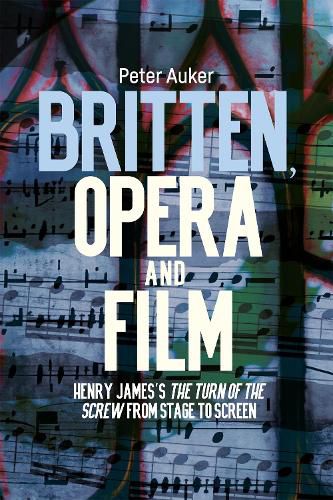Readings Newsletter
Become a Readings Member to make your shopping experience even easier.
Sign in or sign up for free!
You’re not far away from qualifying for FREE standard shipping within Australia
You’ve qualified for FREE standard shipping within Australia
The cart is loading…






Investigates cinematic qualities in opera and reveals why Benjamin Britten's operas lend themselves to TV and film interpretations.
Benjamin Britten's 1954 opera The Turn of the Screw, based on Henry James's ghost story, has been described by many critics and commentators as cinematic. Along with Peter Grimes, The Turn of the Screw is one of the most frequently televised or filmed of Britten's operas. Some of these productions have used location footage and/or studio work, and others are based on theatrical settings. This book explores the notion of cinematic opera in the context of The Turn of the Screw and filmed opera in general, and questions what inherent cinematic qualities exist in the work which make it particularly conducive for screen interpretation, an aspect of Britten's compositional style which has rarely been examined in detail before.
Contrary to the prevailing narrative around Britten's disdain for cinema and television, the composer engaged with film as both a cinemagoer and film music composer early in his career and these experiences informed his compositional and dramatic choices. Archival research reveals clues to the composer's adaptation process. By tracing the progress from Henry James's original novella to operatic stage and screen production, via the development of Myfanwy Piper's libretto and Britten's score, the journey of adaptation is discussed in detail. A key part of the book looks at the subsequent interpretation of the opera on screen. Case studies evaluate eight directors' interpretations of the opera ranging from 1959 up to the 2020s. Included is a special study of Peter Morley's 1959 ITV version, which had previously been thought lost. This reveals the roots of Britten's subsequent engagement with screen media, culminating in his television opera Owen Wingrave. The book also briefly explores the influence of cinema on stage productions of the opera which have not been filmed.
$9.00 standard shipping within Australia
FREE standard shipping within Australia for orders over $100.00
Express & International shipping calculated at checkout
Investigates cinematic qualities in opera and reveals why Benjamin Britten's operas lend themselves to TV and film interpretations.
Benjamin Britten's 1954 opera The Turn of the Screw, based on Henry James's ghost story, has been described by many critics and commentators as cinematic. Along with Peter Grimes, The Turn of the Screw is one of the most frequently televised or filmed of Britten's operas. Some of these productions have used location footage and/or studio work, and others are based on theatrical settings. This book explores the notion of cinematic opera in the context of The Turn of the Screw and filmed opera in general, and questions what inherent cinematic qualities exist in the work which make it particularly conducive for screen interpretation, an aspect of Britten's compositional style which has rarely been examined in detail before.
Contrary to the prevailing narrative around Britten's disdain for cinema and television, the composer engaged with film as both a cinemagoer and film music composer early in his career and these experiences informed his compositional and dramatic choices. Archival research reveals clues to the composer's adaptation process. By tracing the progress from Henry James's original novella to operatic stage and screen production, via the development of Myfanwy Piper's libretto and Britten's score, the journey of adaptation is discussed in detail. A key part of the book looks at the subsequent interpretation of the opera on screen. Case studies evaluate eight directors' interpretations of the opera ranging from 1959 up to the 2020s. Included is a special study of Peter Morley's 1959 ITV version, which had previously been thought lost. This reveals the roots of Britten's subsequent engagement with screen media, culminating in his television opera Owen Wingrave. The book also briefly explores the influence of cinema on stage productions of the opera which have not been filmed.